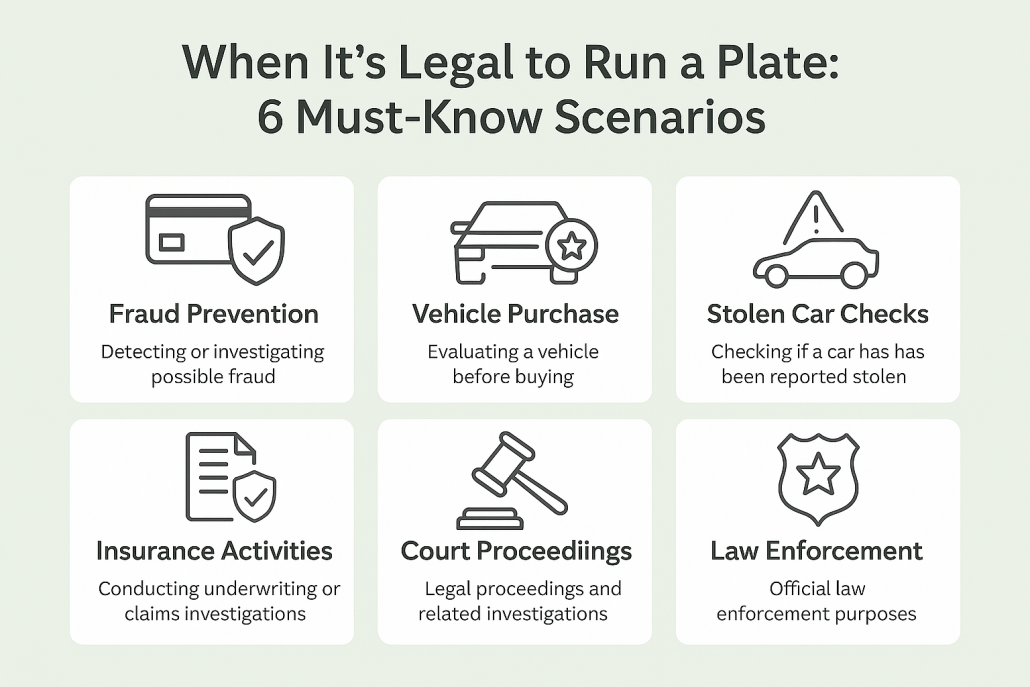When Can You Legally Run a License Plate Search?
You see a suspicious car parked outside your building day after day. Or maybe you’re about to buy a used car and want to verify its history. Can you legally run a license plate lookup to find out more?
A License Plate Lookup can be a powerful tool, but there are strict laws governing what information can be accessed and why. In this guide, we’ll break down the six legitimate reasons for conducting a plate search, explain what data you can (and can’t) legally access, and show how services like VinAudit help you stay compliant.

What the Law Says: The DPPA in a Nutshell
The Driver’s Privacy Protection Act (DPPA) is a federal law that restricts access to personal information tied to motor vehicle records, including license plate numbers. This law was enacted to protect individual privacy and prevent misuse of driver data.
Under the DPPA, you cannot access the registered owner’s name, address, or phone number without a legally valid reason. Violating the DPPA can result in serious legal consequences.
However, there are exceptions. Let’s look at the top six use cases where license plate lookups are not only legal—but often essential.
1. Used Vehicle Purchases
When buying a car, especially from a private seller, verifying its history is crucial. A license plate lookup can reveal:
- Vehicle title status
- Past accidents or flood damage
- Odometer readings
- Manufacturer recalls
✅ Legal? Yes. As long as you’re accessing vehicle data and not personal owner details, you’re in the clear.
2. Fraud Detection and Prevention
Auto-related fraud is common—think title washing, VIN cloning, or selling stolen vehicles. Law enforcement, insurers, and even consumers use license plate lookups to:
- Check for inconsistencies in title records
- Identify altered VINs
- Spot mismatched vehicle data
✅ Legal? Yes. Investigating potential fraud is a permitted use under the DPPA.
3. Stolen Vehicle Recovery
If you suspect a car has been stolen or abandoned, checking its plate can:
- Confirm if it’s listed in national theft databases
- Provide status updates on open investigations
✅ Legal? Yes, especially when working with law enforcement or when reporting to authorities.
Use a tool like VinAudit’s License Plate Lookup to cross-reference with theft databases.
4. Vehicle Recalls and Safety Information
Manufacturers issue recalls for safety-related defects. By checking a license plate, you can identify whether a vehicle:
- Has outstanding recalls
- Is subject to a buyback or repair program
✅ Legal? Yes. This data is available to protect consumer safety.
5. Legal and Insurance Investigations
Attorneys, investigators, and insurers often conduct lookups for:
- Accident liability assessments
- Hit-and-run investigations
- Claims validation
✅ Legal? Yes. These are explicitly permitted under the DPPA.
Note: These entities often use licensed data providers like VinAudit, which comply with privacy laws.
6. Government Agency Use
Government agencies may access plate information for:
- Parking enforcement
- Toll violations
- Vehicle registration compliance
✅ Legal? Yes. Government use is fully sanctioned under federal and state laws.
What You Can Legally Access in a Plate Lookup
While you can’t see personal details, you can access vehicle-related information such as:
- Make and model
- Year
- Title history (e.g., salvage, rebuilt)
- Theft records
- Mileage readings (if reported)
You CANNOT legally obtain:
- Registered owner’s name
- Address or phone number
- Driver’s license information
Final Word: Don’t Guess. Know the Law.
It’s entirely legal to run a license plate lookup in many situations—as long as you stay within the bounds of the DPPA. Whether you’re buying a car, reporting a suspicious vehicle, or confirming safety data, tools like VinAudit make it easy to get the facts without crossing legal lines.
Looking for state-specific information? Start with our top 3 state guides for California, Texas, Florida.
Disclaimer: This article is for informational purposes only and does not constitute legal advice. Always consult an attorney if you’re unsure about your specific case.
If your business relies on VIN-based vehicle history checks, our B2B data products offer fast and compliant API solutions. How to integrate this kind of vehicle history data into your dealership or automotive platform? Explore our B2B vehicle data products.


